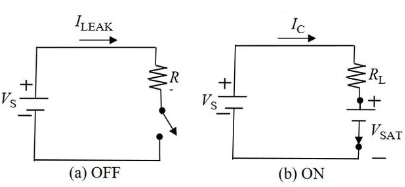2. A switch with the following characteristics controls power to a 25-kW load as shown in Fig. P2.1. The switching frequency is 100 kHz with 50% duty cycle. ILEAK Ic. IRATED = 50 A; VRATED = 500 V ILEAKAGE = 1 mA; VSAT = 1.5 V turn-on time tsw(ON) = 1.5 µs; turn-off time tsw(OFF) = 3.0 μs; Vs = 500 V; The source current Ic(max) = 50 A and R₁ =10 92. (a) Determine the approximate actual period, Tact (b) Determine the turn-on time, ton. (d) Determine the energy loss during turn-on. (f) Determine the on-state energy loss. (h) Determine the total energy loss per cycle. Vs + (a) OFF + (b) ON Fig. P2.1 (c) Determine the turn-off time, tOFF- (e) Determine the energy loss during turn-off. (g) Determine the off-state energy loss (i) Determine the average power loss. RL I VSAT -
2. A switch with the following characteristics controls power to a 25-kW load as shown in Fig. P2.1. The switching frequency is 100 kHz with 50% duty cycle. ILEAK Ic. IRATED = 50 A; VRATED = 500 V ILEAKAGE = 1 mA; VSAT = 1.5 V turn-on time tsw(ON) = 1.5 µs; turn-off time tsw(OFF) = 3.0 μs; Vs = 500 V; The source current Ic(max) = 50 A and R₁ =10 92. (a) Determine the approximate actual period, Tact (b) Determine the turn-on time, ton. (d) Determine the energy loss during turn-on. (f) Determine the on-state energy loss. (h) Determine the total energy loss per cycle. Vs + (a) OFF + (b) ON Fig. P2.1 (c) Determine the turn-off time, tOFF- (e) Determine the energy loss during turn-off. (g) Determine the off-state energy loss (i) Determine the average power loss. RL I VSAT -
Introductory Circuit Analysis (13th Edition)
13th Edition
ISBN:9780133923605
Author:Robert L. Boylestad
Publisher:Robert L. Boylestad
Chapter1: Introduction
Section: Chapter Questions
Problem 1P: Visit your local library (at school or home) and describe the extent to which it provides literature...
Related questions
Question
100%
Please help with question a-c

Transcribed Image Text:2.
A switch with the following characteristics controls power to a 25-kW load as shown in Fig. P2.1. The
switching frequency is 100 kHz with 50% duty cycle.
ILEAK
Ic
IRATED = 50 A; VRATED = 500 V
ILEAKAGE = 1 mA;
VSAT = 1.5 V
turn-on time tsw(ON) = 1.5 us;
turn-off time tsw(OFF) = 3.0 μs;
Vs ;= 500 V;
The source current Ic(max) = 50 A and R₁ =10 22.
(a) Determine the approximate actual period, Tact
(b) Determine the turn-on time, ton.
(d) Determine the energy loss during turn-on.
(f) Determine the on-state energy loss.
(h) Determine the total energy loss per cycle.
Vs
+
R
+
(a) OFF
Fig. P2.1
(c) Determine the turn-off time, tOFF.
(e) Determine the energy loss during turn-off.
(g) Determine the off-state energy loss
(i) Determine the average power loss.
(b) ON
RL
TV SAT
Expert Solution
Step 1
Since it is asked to solve questions (a) to (c) o we are solving these subparts only.
The given circuit diagrams are shown below.

Given information.
Switching frequency is kHz Hz.
Duty cycle is .
Trending now
This is a popular solution!
Step by step
Solved in 4 steps with 1 images

Knowledge Booster
Learn more about
Need a deep-dive on the concept behind this application? Look no further. Learn more about this topic, electrical-engineering and related others by exploring similar questions and additional content below.Recommended textbooks for you

Introductory Circuit Analysis (13th Edition)
Electrical Engineering
ISBN:
9780133923605
Author:
Robert L. Boylestad
Publisher:
PEARSON

Delmar's Standard Textbook Of Electricity
Electrical Engineering
ISBN:
9781337900348
Author:
Stephen L. Herman
Publisher:
Cengage Learning

Programmable Logic Controllers
Electrical Engineering
ISBN:
9780073373843
Author:
Frank D. Petruzella
Publisher:
McGraw-Hill Education

Introductory Circuit Analysis (13th Edition)
Electrical Engineering
ISBN:
9780133923605
Author:
Robert L. Boylestad
Publisher:
PEARSON

Delmar's Standard Textbook Of Electricity
Electrical Engineering
ISBN:
9781337900348
Author:
Stephen L. Herman
Publisher:
Cengage Learning

Programmable Logic Controllers
Electrical Engineering
ISBN:
9780073373843
Author:
Frank D. Petruzella
Publisher:
McGraw-Hill Education

Fundamentals of Electric Circuits
Electrical Engineering
ISBN:
9780078028229
Author:
Charles K Alexander, Matthew Sadiku
Publisher:
McGraw-Hill Education

Electric Circuits. (11th Edition)
Electrical Engineering
ISBN:
9780134746968
Author:
James W. Nilsson, Susan Riedel
Publisher:
PEARSON

Engineering Electromagnetics
Electrical Engineering
ISBN:
9780078028151
Author:
Hayt, William H. (william Hart), Jr, BUCK, John A.
Publisher:
Mcgraw-hill Education,